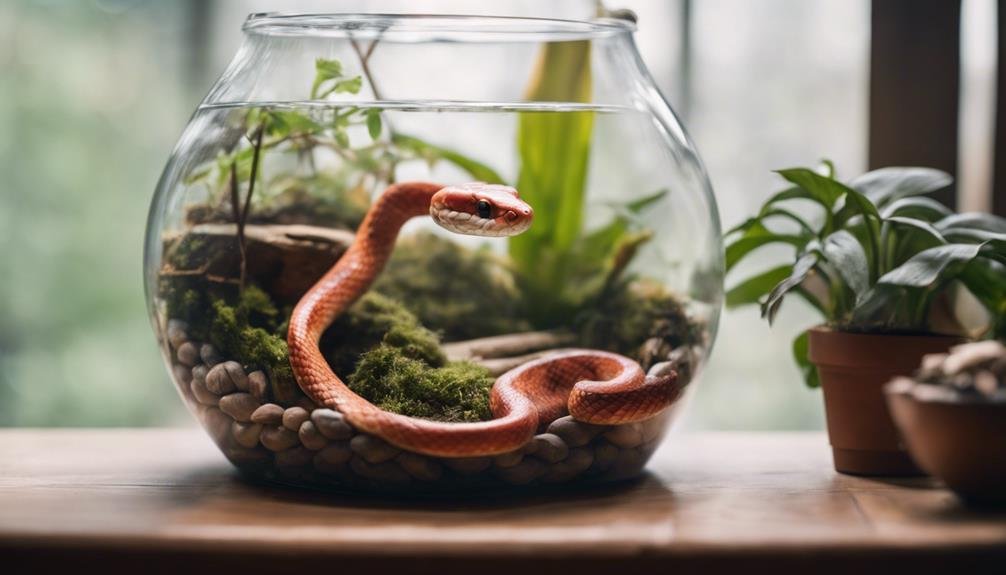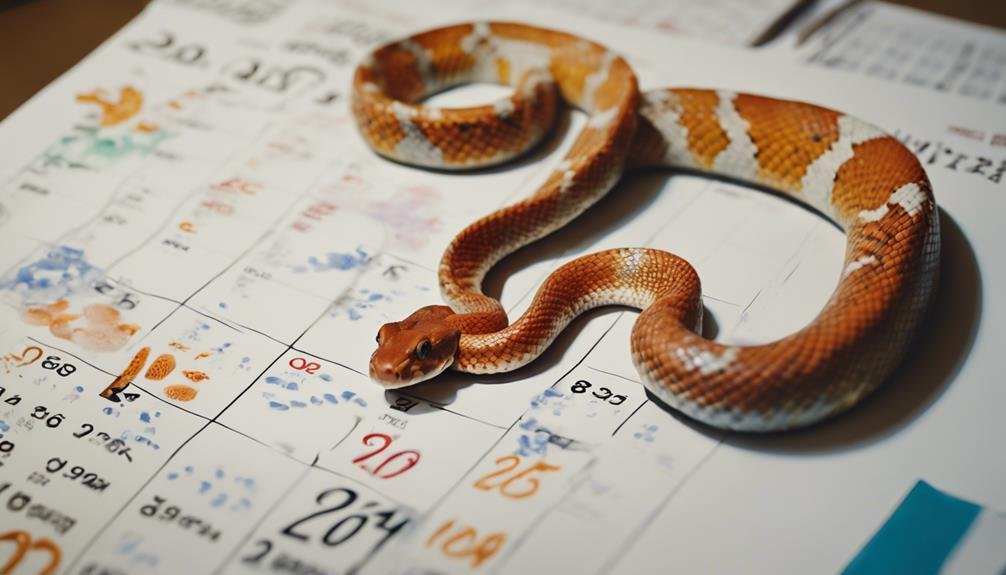If you’re considering a corn snake as your next pet, you’re looking at a creature known for its docile nature and stunning variety of colors. These snakes offer a unique blend of beauty and ease of care, making them an ideal choice for novice and experienced reptile enthusiasts alike. However, before you make a decision, it’s crucial to weigh the pros, such as their manageable size and minimal care requirements, against the cons, including their diet of rodents and the necessity for specialized veterinary care. As you contemplate adding a corn snake to your home, consider what lies ahead in their care, the commitment you’re about to undertake, and how it aligns with your lifestyle.
Key Takeaways
- Corn snakes have a docile nature, making them gentle pets for handlers.
- Their long lifespan of 15-20 years offers a lasting companionship.
- Minimal care requirements and low maintenance needs suit busy owners.
- Vibrant morphs and manageable size appeal to a wide range of enthusiasts.
- Diet of rodents and need for specialized vet care are cons to consider.
Understanding Corn Snakes
Corn snakes, known for their docile nature and vibrant morphs, make an excellent choice for those new to snake ownership. Their ease of handling and long lifespan of 15-20 years offer a rewarding experience for both novice and experienced reptile enthusiasts. Unlike some pets that might require essential care or have unpredictable temperaments, corn snakes present a manageable challenge, especially for first-timers.
One of the most appealing aspects of corn snakes is their variety of colors and patterns. These morphs, ranging from bright oranges to deep reds and even patternless varieties, allow you to choose a snake that truly captivates your interest. This diversity not only adds aesthetic value to your home but also makes the process of selecting your pet uniquely personal.
In terms of care, maintaining the right temperature in their habitat is important for a corn snake’s well-being. They thrive in a properly heated environment that mimics their natural conditions. This aspect of their care is straightforward, emphasizing the suitability of corn snakes for those not yet familiar with the intricacies of reptile maintenance. Their manageable size, between 3-5 feet, further ensures that handling and housing them is a breeze.
Pros of Corn Snake Ownership
When considering corn snakes as pets, you’ll find their low maintenance needs particularly appealing. Their gentle and docile nature makes them ideal companions, especially for those new to snake ownership.
Plus, with a long lifespan, you’re looking at a pet that’ll be part of your family for years to come.
Low Maintenance Needs
Considering their minimal care requirements, corn snakes emerge as an excellent choice for pet owners seeking a low-maintenance companion.
You’ll find their daily needs straightforward, such as the simple task of changing their water and a weekly enclosure cleanup.
Feeding them is hardly a hassle; with a diet primarily consisting of mice, they only need to be fed once every 5 to 14 days, depending on their age. This not only reduces feeding costs but also the time you need to devote to their care.
Additionally, their specific humidity level is easy to maintain, ensuring they remain healthy without constant attention.
Their quiet nature and cleanliness further underscore their status as ideal pets for those with limited free time or a preference for a serene living environment.
Gentle and Docile Nature
Beyond their low maintenance needs, another appealing aspect of corn snakes is their gentle and docile nature, making them ideal pets for both novice and experienced reptile enthusiasts. Their calm demeanor, coupled with a rare tendency to bite or show aggression, guarantees a safe and enjoyable experience for handlers.
This makes them particularly suitable for beginner snake owners in search of a low-maintenance pet. Additionally, their inquisitive and active behavior offers endless fascination, making them not just pets but engaging companions.
Corn snakes are also generally safe around children, provided there’s appropriate supervision, due to their gentle disposition. This blend of easy handling and a docile nature positions corn snakes as a top choice for those venturing into the world of reptile ownership.
Long Lifespan
Corn snakes captivate their owners with a long lifespan, typically ranging between 15 to 20 years, offering decades of companionship. This enduring lifespan means snake owners can enjoy a stable, rewarding relationship, growing and learning together through various stages of both their lives.
The commitment to caring for a corn snake isn’t just about the joy they bring into your home; it’s also about the fulfillment you’ll find in providing a healthy, loving environment over many years. Their long lifespan allows for a deep bond to form, offering continuity and a sense of companionship that evolves.
For snake owners, this means the benefits of pet ownership extend across a significant portion of their lives, making corn snakes an exceptionally rewarding choice.
Cons of Corn Snake Ownership
While corn snakes may seem like intriguing pets, their diet of rodents isn’t appealing to everyone. The thought of keeping and feeding live or frozen mice can be a significant deterrent. Beyond their diet, corn snakes require specialized reptile vet care, which can pose a challenge. Not every vet is equipped to handle reptiles, and those that do often charge a premium for their services. This specialized care can quickly become costly, especially when compared to more common household pets.
Another aspect worth pondering is their long lifespan. Corn snakes can live for 15-20 years, which is a considerable commitment. You’re not just taking care of them for a few years; you’re committing to potentially two decades of care. This long-term commitment means ensuring you’re prepared for the duration of their life.
Lastly, it’s important to realize that corn snakes aren’t the most sociable pets. They prefer limited interaction and aren’t fond of frequent handling. Respecting their need for space is essential for their well-being. If you’re looking for a pet to cuddle with, a corn snake mightn’t be the right choice.
Housing Your Corn Snake


Creating a comfortable living environment for your corn snake is crucial, starting with choosing the right size and type of tank. A glass tank with a secure lid is your best bet to prevent any escape attempts. It’s not just about preventing escapes; it’s about establishing a space that mimics their natural habitat to keep them healthy and happy.
Your corn snake’s home should include a temperature gradient, allowing them to regulate their body temperature by moving between warmer and cooler areas. The substrate you choose, such as aspen shavings or reptile carpet, plays a critical role in this setup. It enables burrowing behaviors and ensures easy cleaning for you.
Hiding spots are non-negotiable. These provide a sense of security for your snake, reducing stress and mimicking the shelters they would seek in the wild.
Here’s a quick overview of what you’ll need:
| Requirement | Description | Importance |
|---|---|---|
| Tank Size | Minimum 20 gallons for adults | Essential |
| Temperature | Gradient 75-90°F | Critical |
| Substrate | Aspen shavings or reptile carpet | For burrowing |
| Hiding Spots | Both warm and cool sides | Reduces stress |
| Ventilation | Proper air flow | Prevents respiratory issues |
Establishing this environment ensures your corn snake thrives under your care.
Corn Snake Diet and Feeding
Understanding what to feed your corn snake is key to ensuring its health and longevity. Corn snakes primarily feast on rodents, with mice being a staple throughout their lives. This diet closely mirrors their natural hunting and eating habits in the wild, providing them with the necessary nutrients for growth and energy.
When it comes to their feeding schedule, it’s crucial to strike the right balance. For baby corn snakes, you’ll need to offer food once a week. This frequent feeding supports their rapid growth and development during the early stages of life. As they mature into adulthood, you can adjust the schedule to feed them every two weeks. This change reflects their slowed growth rate and helps prevent overfeeding, which can lead to health issues.
Finding food for your corn snake won’t be a hassle. Reptile shops and online sources offer a convenient supply of appropriate prey for your pet. Ensuring a consistent and proper diet isn’t just about keeping your snake alive; it’s about promoting a state of vitality and longevity. By maintaining a suitable feeding schedule, you’re setting the foundation for your corn snake’s well-being, making them a joy to care for in your home.
Long-Term Commitment Considerations


When considering a corn snake as a pet, you must understand that their lifespan expectancy can reach up to 20 years, requiring a significant, long-term commitment.
You’ll need to consistently meet their ongoing care needs, from feeding to habitat maintenance, throughout their life.
Additionally, as they grow, your snake’s space requirements will evolve, necessitating adjustments to their living environment to keep them healthy and happy.
Lifespan Expectancy
Considering a corn snake’s lifespan of 15 to 20 years, you’ll need to prepare for the long haul in pet ownership. Their longevity isn’t just a reflection of their resilience but also a clear indication of the dedication required from you.
Owning a corn snake means you’re in it for the long term, embracing both the joys and responsibilities that come with such a companion. The fact that these snakes can live up to two decades makes rehoming a challenge, highlighting the importance of being fully prepared before bringing one into your life.
Understanding this commitment is vital, as it ensures you’re ready to provide for your corn snake throughout its entire life, making longevity a key factor to weigh in your decision.
Ongoing Care Needs
Acknowledging the long lifespan of corn snakes highlights the need to focus on their ongoing care requirements. With a life span of 15 to 20 years, you’re in it for the long haul. Here’s a concise breakdown of what their care entails:
| Requirement | Frequency | Notes |
|---|---|---|
| Feeding | Weekly/Bi-weekly | Babies weekly, adults bi-weekly |
| Vet Check-Ups | As needed | Preferably with reptile experts |
| Space Accommodations | Long-term | Grows 3-5 feet |
| Handling | Limited | Respect their space |
| Commitment | 15-20 years | Ready for the long-term |
Understanding these ongoing care needs ensures you’re prepared for the commitment. Remember, their well-being relies on your consistent care and attention over their impressive life span.
Space Requirements Evolution
As your corn snake grows, you’ll need to adapt its habitat to meet its evolving space requirements, ensuring it thrives throughout its potential 20-year lifespan. Starting with a minimum 20-gallon tank accommodates their need for space to move and hide, but it’s just the beginning.
Owning a corn snake is a long-term commitment, not just because of their lengthy lifespan but due to the need for a secure, well-maintained habitat. This includes proper heating, lighting, and a substrate that’s easy to clean. Additionally, regular vet check-ups become part of the routine to make sure your corn snake remains healthy.
Adjusting tank size and habitat features over time is essential, reflecting the importance of understanding and committing to the care they require for decades.
Can Corn Snakes Thrive on a Diet of ReptiLinks as Pets?
Corn snake diet options are varied, but ReptiLinks can be a great choice for pet owners. These sausage-shaped, nutritious reptile food come in different flavors and are easy to store. They contain balanced nutrients for a healthy diet, making them a convenient choice for corn snake owners.
Conclusion
To conclude, corn snakes are ideal pets for beginners because of their gentle demeanor, vibrant color variations, and ease of care. Their manageable size and minimal maintenance requirements make them a popular choice.
However, it’s important to consider their dietary needs, the need for specialized veterinary care, and the long-term commitment involved. If you’re prepared to provide the necessary care and attention, a corn snake can be a fantastic addition to your household, providing years of companionship and pleasure.


